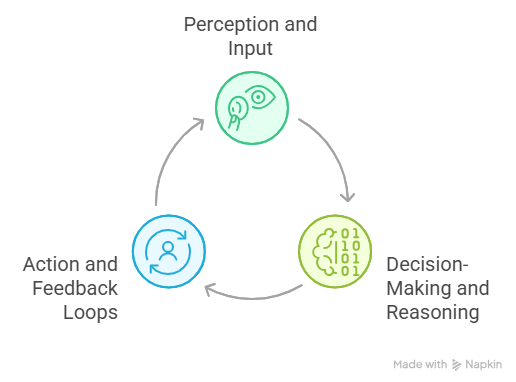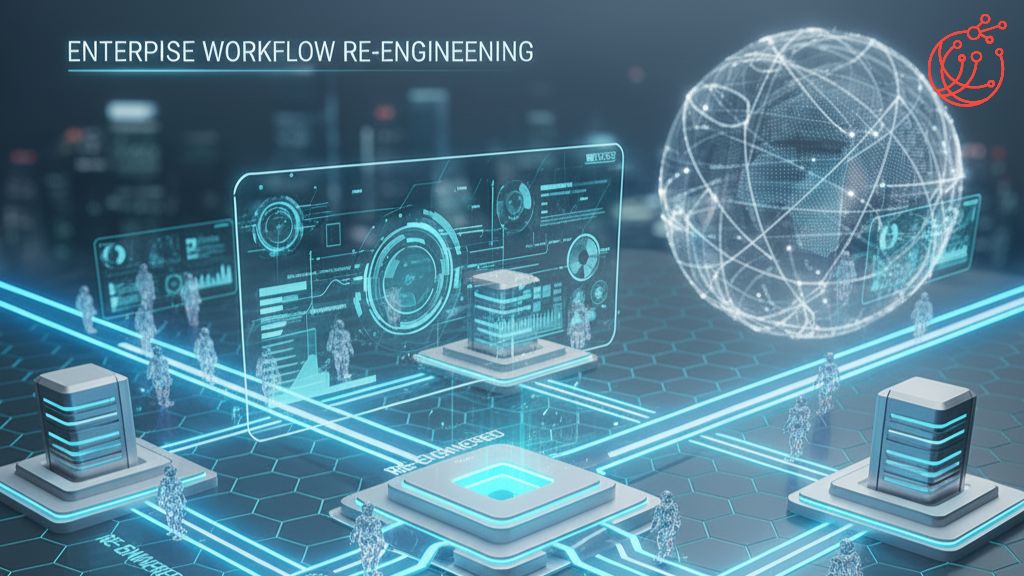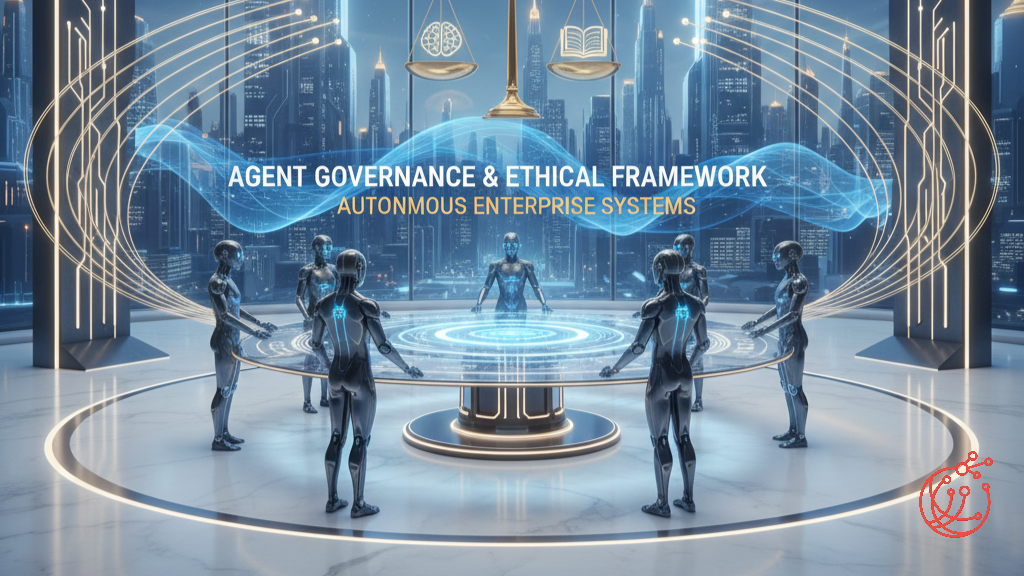Table Of Contents
AI agents are autonomous systems that analyze data, make decisions, and take action, transforming industries in unprecedented ways. According to a McKinsey report, companies adopting AI can achieve productivity improvements of up to 40%. AI agents play a crucial role in this by automating repetitive tasks, reducing manual labor, and enhancing decision-making through real-time data analysis. These systems adapt quickly, making them invaluable in sectors like customer service, finance, and healthcare, effectively shifting software from a mere tool to a proactive digital worker.
As AI becomes more integrated into daily life, its impact is increasingly visible. Facial recognition technology, virtual assistants like Siri and Alexa, and personalized content creation on platforms like Netflix and YouTube are all powered by AI agents. These applications use AI to understand context, predict user behavior, and deliver tailored experiences. In fact, 80% of companies are already investing in AI tools to improve customer engagement and streamline processes. For beginners, understanding AI agents is crucial as they offer practical benefits that can lead to both personal and professional growth, from automating everyday tasks to improving overall work efficiency.
1. Introduction: Why AI Agents Matter
Artificial Intelligence (AI) has moved far beyond being a futuristic concept—it is now a force transforming industries across the globe. At the heart of this transformation are AI agents, autonomous systems that analyze data, make decisions, and act with little to no human intervention.
Unlike traditional software, AI agents aren’t just passive tools waiting for instructions. They actively perceive their environment, adapt to changes, and proactively work toward achieving specific goals. By automating repetitive processes, they save time, cut costs, and improve decision-making. This shift—from software as a tool to software as a digital worker—marks one of the most important changes in modern technology.
1.1 The Rise of AI in Daily Life
AI already plays a role in our everyday lives, often in ways we don’t consciously notice. Smartphones use facial recognition to unlock instantly. Virtual assistants like Alexa and Siri schedule reminders and answer questions. Netflix and Amazon provide tailored recommendations based on personal viewing and shopping behavior.
In industries, the applications are even broader. Finance firms deploy AI agents for fraud detection, supply chains use them for predictive inventory management, and the healthcare sector relies on them for analyzing patient data. Self-driving cars are another powerful example—entirely dependent on AI agents to perceive the world, plan routes, and act safely in real time.
1.2 Why Beginners Should Learn About AI Agents
For beginners, learning about AI agents isn’t just about understanding a buzzword. It’s about developing skills that open doors in every industry. Whether you’re a student, entrepreneur, or professional, knowing how AI agents work helps you:
- Automate tasks that save valuable time.
- Enhance customer service through chatbots and virtual assistants.
- Reduce errors in decision-making processes.
- Stand out in the job market by demonstrating knowledge of emerging technologies.
Understanding AI agents equips you to leverage them both personally and professionally, making you more efficient, innovative, and future-ready.
2. What Are AI Agents?
AI agents are autonomous software systems that perceive their environment, reason through the data, and act to achieve specific goals. These systems are cloud-based, leverage machine learning for decision-making, and are capable of scaling far beyond traditional software. Unlike conventional programs that rely on predefined rules, AI agents use dynamic learning algorithms to adapt and optimize their functions. There are several types of AI agents, including:
- Simple Reflex Agents: Basic systems that respond to specific stimuli.
- Goal-Based Agents: Focus on achieving specific outcomes.
- Learning Agents: Adapt over time through experience.
The versatility of these agents enables them to perform a wide range of tasks, from basic automation to complex predictive analytics.
Challenges of AI Agents
Despite their many advantages, AI agents come with a set of challenges that must be addressed for optimal use. Data quality is a critical issue: poor data leads to inaccurate predictions and decisions. Furthermore, the ethical concerns surrounding AI, such as bias in decision-making and transparency in automated processes, are major obstacles to their widespread acceptance. AI Ethics: A Guide for the Perplexed provides a deep dive into ethical issues around AI. Privacy risks also play a significant role, as AI agents often handle sensitive data. According to a Gartner study, 60% of businesses report data privacy as a significant concern when deploying AI systems.
2.1 Definition and Characteristics
AI agents are defined by four main traits:
- Autonomy: They function independently without constant human instructions.
- Reactivity: They respond to changes in their environment.
- Proactiveness: They take initiative to achieve goals rather than waiting for prompts.
- Social ability: They interact with humans and other agents to collaborate or share knowledge.
These characteristics make AI agents not just powerful but versatile—capable of working in unpredictable, dynamic environments.
2.2 How They Differ from Traditional Software
Traditional software typically follows fixed, predefined rules. AI agents, by contrast:
- Deployment: They’re often cloud-based, accessible anywhere, and constantly updated.
- Functionality: Instead of hard-coded rules, they use machine learning to analyze data and adapt.
- Scalability: They can handle millions of interactions or data points simultaneously without extra hardware.
This difference makes AI agents far more flexible, dynamic, and capable of growth.
3. Types of AI Agents
AI agents are not one-size-fits-all. They can be grouped into different types, each designed for a specific level of complexity and purpose.
3.1 Simple Reflex Agents
These agents act based only on the current situation. Using basic if-then rules, they react quickly to inputs. Think of a thermostat that turns on heating if the temperature drops below a set point.
While fast and efficient, they cannot handle complex or changing environments since they lack memory or contextual understanding.
3.2 Goal-Based and Utility-Based Agents
- Goal-Based Agents: These agents pursue specific objectives. For example, a navigation app agent’s goal might be to get you to your destination as quickly as possible. Once the goal is reached, the task is complete.
- Utility-Based Agents: These agents go a step further. They don’t just achieve goals; they make optimized decisions by weighing different factors. A ride-hailing app, for instance, balances cost, time, and route efficiency to provide the “best” ride.
3.3 Learning Agents and Multi-Agent Systems
- Learning Agents: These evolve through experience, improving their performance over time. A spam filter is a simple example, getting better at detecting junk emails as it learns from user feedback.
- Multi-Agent Systems (MAS): These involve multiple agents working together or competing. Autonomous vehicles coordinating traffic or trading bots in finance are examples where agents must collaborate or compete to optimize outcomes.
4. How AI Agents Work
At a high level, AI agents operate in a three-step cycle: perception, decision-making, and action.

4.1 Perception and Input
Agents collect data through sensors or APIs. A self-driving car, for example, uses cameras, radar, and GPS to understand its surroundings.
Modern AI models allow agents to process multimodal inputs—text, audio, and images—making them more context-aware and capable of complex reasoning.
4.2 Decision-Making and Reasoning
Once data is gathered, the agent evaluates options and decides on the best course of action. This decision-making can be rule-based, heuristic-driven, or powered by advanced machine learning models.
For example, a financial trading bot decides whether to buy or sell based on thousands of variables, weighing potential risks and rewards in milliseconds.
4.3 Action and Feedback Loops
After making decisions, agents act—executing commands, sending outputs, or changing physical states. Importantly, they also learn from the outcomes.
Feedback loops are essential because they refine the agent’s future actions. A recommendation engine, for instance, improves as it sees which suggestions users accept or reject.
5. Real-Life Examples of AI Agents
AI agents aren’t abstract concepts — they’re already woven into the fabric of modern life. Here are some of the most impactful real-world applications:
- Virtual Assistants: Siri, Alexa, and Google Assistant act as personal AI agents. They listen, interpret natural language, and take actions such as setting reminders, controlling smart devices, or playing music.
- Customer Support Chatbots: Businesses deploy AI-powered chatbots that resolve common questions instantly. They reduce wait times, offer 24/7 support, and free human agents to focus on complex cases.
- Self-Driving Cars: Autonomous vehicles rely on AI agents to process sensor data, detect obstacles, plan routes, and make split-second driving decisions.
- E-commerce Recommendations: Platforms like Netflix, Spotify, and Amazon use AI agents to analyze behavior and deliver personalized suggestions, boosting engagement and sales.
- Healthcare Applications: AI diagnostic tools act as agents by scanning medical images, predicting disease risks, and even assisting doctors with treatment planning.
These examples show that AI agents are not confined to research labs — they’re practical, accessible, and already delivering measurable value in daily life.
6. Benefits of AI Agents
The growing adoption of AI agents is driven by the tangible advantages they bring:
- Efficiency and Productivity: By automating repetitive and time-consuming tasks, AI agents free up employees to focus on creative, strategic, or human-centered work.
- Cost Reduction: Businesses save money by reducing the need for manual labor, minimizing errors, and streamlining operations.
- Scalability: Whether it’s handling thousands of customer inquiries or analyzing millions of data points, AI agents scale effortlessly without additional infrastructure.
- Personalization: From tailored shopping recommendations to custom wellness plans, AI agents analyze preferences and deliver experiences that feel unique to each individual.
- Always-On Availability: Unlike human workers, AI agents don’t need breaks, meaning customers and businesses can rely on round-the-clock support and monitoring.
These benefits make AI agents a cornerstone of digital transformation strategies across industries.
7. Challenges and Limitations
Despite their promise, AI agents are not without flaws. Recognizing their limitations is key to using them responsibly:
- Data Quality and Bias: AI agents are only as good as the data they’re trained on. Poor, incomplete, or biased data can lead to flawed decisions or unfair outcomes.
- Privacy and Security Risks: Because AI agents process sensitive information, they can become targets for data breaches or misuse. Ensuring compliance with privacy laws and encryption standards is critical.
- Ethical Concerns: Who is accountable when an AI agent makes a wrong decision? Lack of transparency in decision-making raises ethical questions about fairness and responsibility.
- Development Costs: Building advanced AI agents requires substantial investment in technology, talent, and infrastructure. Smaller organizations may find adoption challenging.
Understanding these challenges helps businesses and individuals adopt AI agents in ways that are safe, ethical, and sustainable.
8. The Future of AI Agents
The future of AI agents is not just about doing more — it’s about doing better. Here’s what’s on the horizon:

- Greater Collaboration with Humans: AI agents will increasingly act as partners, complementing human strengths rather than replacing them. Expect to see more co-pilot models in workplaces.
- Context-Aware Intelligence: Instead of reacting to isolated inputs, next-generation agents will understand context — analyzing multiple data streams to make more nuanced decisions.
- Integration with Emerging Tech: Quantum computing, edge AI, and 5G will supercharge agents, enabling real-time decision-making at massive scales.
- Industry Transformation: From precision healthcare and personalized education to smart manufacturing and energy optimization, AI agents will redefine how industries operate.
- Ethical AI Frameworks: Regulations and global standards will evolve, making transparency, fairness, and accountability a core part of agent design.
AI agents are evolving from reactive helpers into sophisticated digital colleagues that can handle complex, dynamic environments with minimal supervision.
9. Getting Started with AI Agents
For beginners, diving into AI agents might feel overwhelming, but breaking it into steps makes the journey manageable:
- Define a Goal: Start simple. Do you want to automate scheduling, create a chatbot, or analyze financial data? A clear goal gives your project direction.
- Pick the Right Tools: Explore no-code or low-code platforms like Lindy or Bedrock if you’re just starting out, or frameworks like LangChain if you have some coding experience.
- Build a Small Project: Instead of aiming for a complex system right away, start with a practical example — like a customer support bot or a personal task manager.
- Test, Learn, and Improve: Treat your first agent as a prototype. Observe how it performs, refine its logic, and gradually expand features.
- Learn by Doing: Tutorials, open-source projects, and communities can accelerate learning. Don’t just read about agents — build and experiment.
The best way to understand AI agents is to create one yourself. With today’s accessible tools, anyone can experiment and unlock the potential of digital workers.
Conclusion: Embracing the Future with AI Agents
AI agents are not just a technological advancement; they represent a paradigm shift in how businesses operate, engage with customers, and make decisions. By integrating AI agents into your operations, you can automate complex workflows, enhance customer experiences, and drive innovation.
Kovench stands at the forefront of this transformation, offering tailored AI and blockchain solutions that empower businesses to scale efficiently and securely. Their expertise in developing autonomous agents for trading, communication, and real-time decision-making ensures seamless operations across various industries.
As AI continues to evolve, partnering with experts like Kovench can help you navigate the complexities of AI integration, ensuring that your business remains competitive and future-ready.

.jpg)





